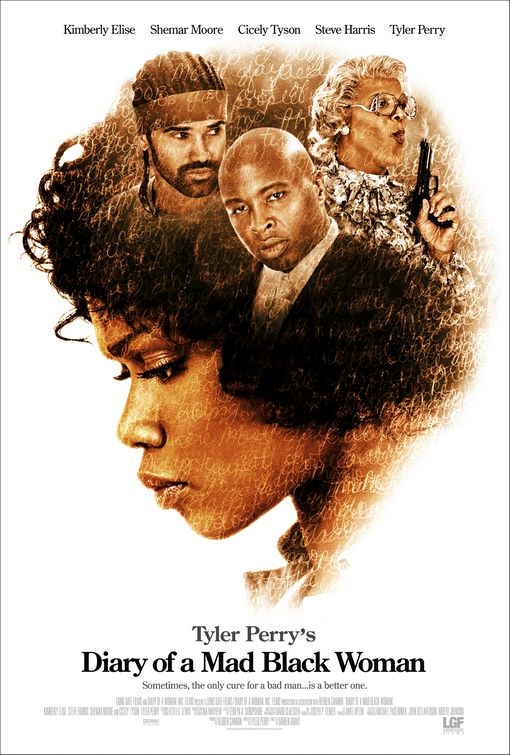“Cast Your Cares Upon Jesus”

| None | Light | Moderate | Heavy | |
|---|---|---|---|---|
| Language | ||||
| Violence | ||||
| Sex | ||||
| Nudity |
What You Need To Know:
The first part of DIARY OF A MAD BLACK WOMAN is very uneven. The movie veers between outlandish, earthy comedy and stark melodrama. The rest of the movie also contains these things, but they are tempered by an emotionally powerful, ultimately uplifting spiritual tone infused with the Gospel of Jesus Christ. It all comes together in the movie’s Christian references, including several positive Gospel songs. MOVIEGUIDE® advises caution for teenagers under 17, however.
Content:
(CCC, BB, Pa, AB, H, LLL, V, S, A, DD, M) Very strong Christian worldview with strong moral elements extolling Jesus and forgiveness instead of revenge, including very strong Christian resolution in church and Gospel songs referring to God, Jesus Christ and the Holy Spirit, with some pagan attitudes and earthy pagan humor, plus two comical characters disrespect Christian beliefs in purity and forgiveness, but they are ultimately rebuked; 46 light obscenities (mostly “h” word), two strong exclamatory profanities to Jesus, four light profanities, and man mocks Christian notions of forgiveness by passing gas in one scene; husband drags wife out of their house and shuts the door on her, woman slaps man, elderly woman threatens people with handgun from her purse (treated as a joke demonstrating her feisty character), women rip clothes on hangers, woman uses chainsaw on couch, woman dumps paralyzed man in wheelchair into bathtub and almost lets him drown, and gangster shoots man in courtroom, in longshot; light sexual innuendoes such as elderly man tells woman that he’s got some Viagra and talks about getting some Vaseline in another comment, elderly man leers at woman’s clothed rear end once, wife finds husband with his mistress and their child, kissing standing up and lying down, elderly man gets aroused by woman on exercise TV program, and narrator spends evenings together with her boyfriend but says in voiceover that they did not do sex because they are Christians, but it is unclear later whether they finally decided to fornicate; no nudity but some female cleavage; alcohol use; smoking marijuana in one scene treated as a joke, comic reference to mixing marijuana and lithium, references to woman being a junkie, and drug addicted woman briefly shown going “cold turkey” in her room at a rehab center; and, themes of revenge and adultery rebuked.
More Detail:
This positive ending is not foreshadowed by the movie’s stark opening, which begins with a rich black lawyer named Charles throwing his wife of 18 years, Helen, out of their big mansion, in favor of his mistress and their two illegitimate children. With no place to go, Helen knocks on her feisty grandmother’s house. Her grandmother, Madea, who is clearly played by a man in a fat woman suit, urges Helen to go back and demand what is hers. Helen reluctantly agrees, and the two women end up in jail. Admonished by the judge, Helen and Madea get out, but the judge places Madea under house arrest, because this isn’t the first time she’s been in the judge’s court.
Slowly, Helen puts her life back in order. She gets a waitress job, hires her cousin, Brian, as her divorce lawyer, goes to church, and starts a romance with Brian’s handsome friend Orlando, who also happens to be the U-haul driver hired by her husband to take her and her clothes wherever she wanted to go. Despite her judgment that the good-natured Orlando seems too good to be true, Helen falls in love with him.
Helen also reunites with her mother, Myrtle. Though still healthy, Myrtle is in a nursing home because Helen’s mean, philandering husband didn’t want them to be burdened with her. Myrtle, however, is a forgiving Christian who counsels Helen that Helen must learn to forgive her husband, before Helen’s anger and revenge gets the better of her. In a major sub-plot, Myrtle also counsels Helen’s cousin, Brian, to try to keep helping his estranged, junkie wife get off drugs.
Although Helen makes real progress as a realistic, but forgiving Christian, a twist of fate gives her the opportunity for sweet revenge against her husband, who is as mean and evil as ever. Helen’s anger gets the better of her for a time, but events lead to a Christian conclusion ending in a rousing, Christ-centered Gospel church service.
The first part of DIARY OF A MAD BLACK WOMAN is very uneven. Before Helen re-discovers Jesus through her mother and her boyfriend, Orlando, the movie veers between outlandish, earthy comedy and stark melodrama. The rest of the movie also contains these things, but they are tempered by a quiet, emotionally powerful, ultimately uplifting tone infused with the Gospel of Jesus Christ. It all comes together in the movie’s Christian references, including several positive Gospel songs.
Screenwriter and producer Tyler Perry not only plays the serious cousin, he also appears in makeup as the feisty gun-toting grandmother, Madea, and Madea’s pot-smoking elderly brother Joe. Madea and Joe are outrageous characters who don’t really fit the rest of the movie, but Joe is the more obnoxious character. Many viewers will laugh heartily at Madea’s feisty attitude. Madea’s belief in revenge and Joe’s lewd behavior are contrasted with the benevolent Christian character of Helen’s mother and the movie’s very strong Christian worldview. In fact, the movie has one of the stronger overtly Christian endings in recent years, except for a couple outtakes during the end credits. One of the repeated Christian messages in this movie is not only the need for forgiveness and compassion but also the message that we must cast our cares upon our Savior, Jesus Christ.
Not surprisingly, this Christian worldview has begun to make DIARY OF A MAD BLACK WOMAN something of a sleeper hit. That said, the script and some of the performances definitely need more judicious editing. Also, some of the movie’s earthy humor, drug references and an abundant use of the “h” obscenity require caution for teenagers under 16 or 17. The conflict between Helen and her husband is also somewhat disturbing in a few scenes, but DIARY OF A MAD BLACK WOMAN is good enough, and overtly redemptive enough, to be considered for the Epiphany Prize for Most Inspiring Movie next year.


 - Content:
- Content: 





